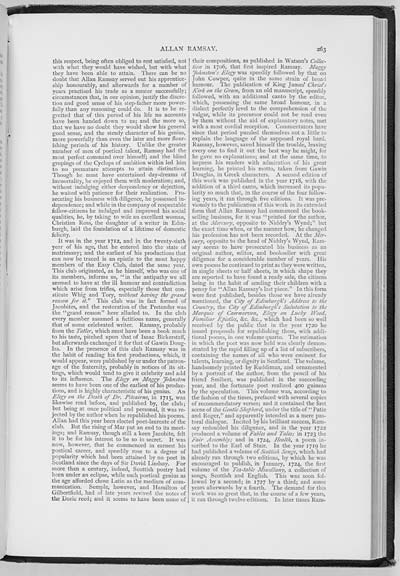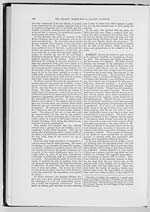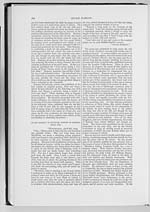263
this respect, being often obliged to rest satisfied, not
with what they would have wished, but with what
they have been able to attain. There can be no
doubt that Allan Ramsay served out his apprentice-
ship honourably, and afterwards for a number of
years practised his trade as a master successfully;
circumstances that, in our opinion, justify the discre-
tion and good sense of his step-father more power-
fully than any reasoning could do. It is to be re-
gretted that of this period of his life no accounts
have been handed down to us; and the more so,
that we have no doubt they would show his general
good sense, and the steady character of his genius,
more powerfully than even the later and more flour-
ishing periods of his history. Unlike the greater
number of men of poetical talent, Ramsay had the
most perfect command over himself; and the blind
gropings of the Cyclops of ambition within led him
to no premature attempts to attain distinction.
Though he must have entertained day-dreams of
immortality, he enjoyed them with moderation; and,
without indulging either despondency or dejection,
he waited with patience for their realization. Pro-
secuting his business with diligence, he possessed in-
dependence; and while in the company of respectable
fellow-citizens he indulged and improved his social
qualities, he, by taking to wife an excellent woman,
Christian Ross, the daughter of a writer in Edin-
burgh, laid the foundation of a lifetime of domestic
felicity.
It was in the year 1712, and in the twenty-sixth
year of his age, that he entered into the state of
matrimony; and the earliest of his productions that
can now be traced is an epistle to the most happy
members of the Easy Club, dated the same year.
This club originated, as he himself, who was one of
its members, informs us, "in the antipathy we all
seemed to have at the ill humour and contradiction
which arise from trifles, especially those that con-
stitute Whig and Tory, without having the grand
reason for it." This club was in fact formed of
Jacobites, and the restoration of the Pretender was
the "grand reason" here alluded to. In the club
every member assumed a fictitious name, generally
that of some celebrated writer. Ramsay, probably
from the Tatler, which must have been a book much
to his taste, pitched upon that of Isaac Bickerstaff,
but afterwards exchanged it for that of Gawin Doug-
las. In the presence of this club Ramsay was in
the habit of reading his first productions, which, it
would appear, were published by or under the patron-
age of the fraternity, probably in notices of its sit-
tings, which would tend to give it celebrity and add
to its influence. The Elegy on Maggy Johnston
seems to have been one of the earliest of his produc-
tions, and is highly characteristic of his genius. An
Elegy on the Death of Dr. Pitcairne, in 1715, was
likewise read before, and published by, the club;
but being at once political and personal, it was re-
jected by the author when he republished his poems.
Allan had this year been elected poet-laureate of the
club. But the rising of Mar put an end to its meet-
ings; and Ramsay, though still a keen Jacobite, felt
it to be for his interest to be so in secret. It was
now, however, that he commenced in earnest his
poetical career, and speedily rose to a degree of
popularity which had been attained by no poet in
Scotland since the days of Sir David Lindsay. For
more than a century, indeed, Scottish poetry had
been under an eclipse, while such poetical genius as
the age afforded chose Latin as the medium of com-
munication. Semple, however, and Hamilton of
Gilbertfield, had of late years revived the notes of
the Doric reed; and it seems to have been some of
their compositions, as published in Watson's Collec-
tion in 1706, that first inspired Ramsay. Maggy
Johnston's Elegy was speedily followed by that on
John Cowper, quite in the same strain of broad
humour. The publication of King James' Christ's
Kirk on the Green, from an old manuscript, speedily
followed, with an additional canto by the editor,
which, possessing the same broad humour, in a
dialect perfectly level to the comprehension of the
vulgar, while its precursor could not be read even
by them without the aid of explanatory notes, met
with a most cordial reception. Commentators have
since that period puzzled themselves not a little to
explain the language of the supposed royal bard.
Ramsay, however, saved himself the trouble, leaving
every one to find it out the best way he might, for
he gave no explanations; and at the same time, to
impress his readers with admiration of his great
learning, he printed his motto, taken from Gawin
Douglas, in Greek characters. A second edition of
this work was published in the year 1718, with the
addition of a third canto, which increased its popu-
larity so much that, in the course of the four follow-
ing years, it ran through five editions. It was pre-
viously to the publication of this work in its extended
form that Allan Ramsay had commenced the book-
selling business, for it was "printed for the author,
at the Mercury, opposite to Niddry's Wynd;" but
the exact time when, or the manner how, he changed
his profession has not been recorded. At the Mer-
cury, opposite to the head of Niddry's Wynd, Ram-
say seems to have prosecuted his business as an
original author, editor, and bookseller with great
diligence for a considerable number of years. His
own poems he continued to print as they were written,
in single sheets or half sheets, in which shape they
are reported to have found a ready sale, the citizens
being in the habit of sending their children with a
penny for "Allan Ramsay's last piece." In this form
were first published, besides those we have already
mentioned, the City of Edinburgh's Address to the
Country, the City of Edinburgh's Salutation to the
Marquis of Caernarvon, Elegy on Lucky Wood,
Familiar Epistles, &c. &c., which had been so well
received by the public that in the year 1720 he
issued proposals for republishing them, with addi-
tional poems, in one volume quarto. The estimation
in which the poet was now held was clearly demon-
strated by the rapid filling up of a list of subscribers,
containing the names of all who were eminent for
talents, learning, or dignity in Scotland. The volume,
handsomely printed by Ruddiman, and ornamented
by a portrait of the author, from the pencil of his
friend Smibert, was published in the succeeding
year, and the fortunate poet realized 400 guineas
by the speculation. This volume was, according to
the fashion of the times, prefaced with several copies
of recommendatory verses; and it contained the first
scene of the Gentle Shepherd, under the title of " Patie
and Roger," and apparently intended as a mere pas-
toral dialogue. Incited by his brilliant success, Ram-
say redoubled his diligence, and in the year 1722
produced a volume of Fables and Tales; in 1723 the
Fair Assembly; and in 1724, Health, a poem in-
scribed to the Earl of Stair. In the year 1719 he
had published a volume of Scottish Songs, which had
already run through two editions, by which he was
encouraged to publish, in January, 1724, the first
volume of the Tea-table Miscellany, a collection of
songs, Scottish and English. This was soon fol-
lowed by a second; in 1727 by a third; and some
years afterwards by a fourth. The demand for this
work was so great that, in the course of a few years,
it ran through twelve editions. In later times Ram-

![]() Universal Viewer |
Universal Viewer | ![]() Mirador |
Large image | Transcription
Mirador |
Large image | Transcription
![]()

